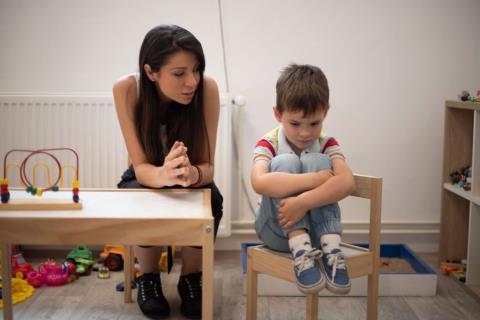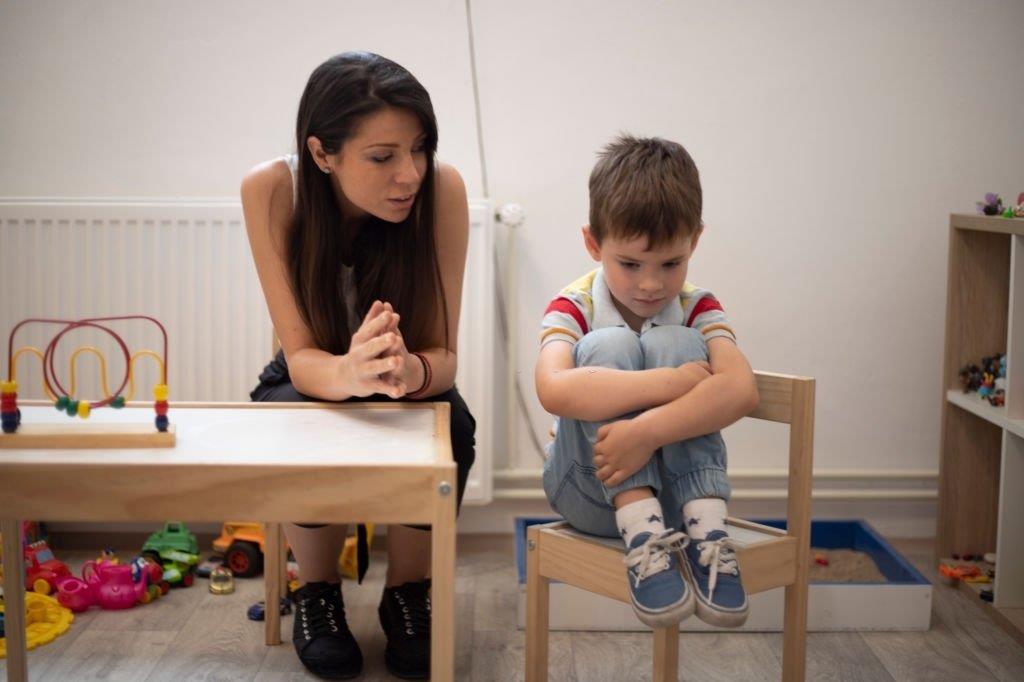Opposition defiant disorder (ODD): Causes, diagnosis, and treatment

Every child has periods of irritability and irritability. Is this a normal condition? How can oppositional defiant disorder (ODD) be differentiated from a child's normal adulthood? Let's find out with Master, Doctor Vu Thanh Do through the article below.
content
- 1. What is oppositional defiant disorder (ODD)?
- 2. Symptoms of oppositional defiant disorder in children
- 3. When do you need to take your child to the doctor?
- 4. What causes oppositional defiant disorder in children?
- 5. What are the risk factors for the child's oppositional defiant disorder?
- 6. Complications include what?
- 7. How to prevent oppositional defiant disorder
- 8. How is oppositional defiant disorder diagnosed?
- 9. How is oppositional defiant disorder treated?
- 10. Activities for Children with Oppositional Defiance Disorder
1. What is oppositional defiant disorder (ODD)?
Even a well-behaved child has ups and downs. However, if children or adolescents (teens) tend to be short-tempered, excitable, aggressive, or rebellious, etc., it is likely that the child has oppositional defiant disorder.
Treatment of ODD includes learning how to build a harmonious family and learning how to control inappropriate behavior. In addition, several other treatments may be considered to incorporate treatment for this mental health disorder.
Severity of ODD varies in severity:
- Mild: Symptoms usually appear only in one place, at a specific time. For example, only appear at school, home or work with colleagues.
- Moderate: Symptoms appear in 2 different places.
- Severe: Symptoms appear in 3 or more places.
Some children only have symptoms at home, but then they get worse, appearing at school and in socializing with friends.
2. Symptoms of oppositional defiant disorder in children
Sometimes, it can be really difficult to distinguish between stubbornness and defiant disorder. Usually, oppositional behavior can still appear at some stage in the child's adulthood.
Signs of ODD will usually appear from the time the child is in kindergarten. Occasionally, ODD can appear at an older age, but usually before puberty. Oppositional behaviors can greatly affect family, social functioning, school, and work.
According to the DSM-5, diagnostic criteria for oppositional defiant disorder include mood and behavioral symptoms, lasting more than 6 months, including:
Angry, irritable mood:
- Often lose composure.
- Often excitable and easily annoyed by others.
- Easily angered, feeling resentful.

Getting angry easily, feeling resentful are symptoms of oppositional defiant disorder
Controversial or defiant behavior:
- Often argues with parents or older adults.
- Challenging behavior and refusal to follow adult instructions.
- Easily feel annoyed or upset.
- Often blames others for their own mistakes.
Vulnerability:
- Often shows hostility and hatred.
- Has a hostile, hateful attitude at least 2 times in 6 weeks.
3. When do you need to take your child to the doctor?
Children often do not recognize their own abnormal behavior. Instead, children often blame unreasonable reasons or people. If your child is showing signs of ODD or unusual behavior or you are having trouble parenting, you should see a pediatric psychiatrist or child psychologist.
4. What causes oppositional defiant disorder in children?
The exact cause of oppositional defiant disorder is unknown. However, there are factors such as genetics and environment that contribute to this condition.
- Genetics: They contribute to the formation of a child's temperament and abnormalities in the biochemistry of brain and nerve pathways.
- Environment: Problems in the way parents raise children, including inconsistencies in the way of education, substance abuse or neglect to nurture children
Children who grow up in abuse often experience a lot of personality damage. See more articles about: Domestic Violence .
5. What are the risk factors for the child's oppositional defiant disorder?
Oppositional defiant disorder is often a complex medical condition. Risk factors include:
- Temperament: The child is temperamental, easily impulsive, or has difficulty controlling emotions
- Problems from raising children: Children who have been addicted to substances or have attention deficits, do not have a unified discipline method, or have limited parental vision.
- Other family problems: If the child is born in a family with a discordant parent, or a parent who is addicted to drugs or has a mental illness, the child's risk of developing ODD is higher.
- Living environment: Oppositional defiant disorder can be more severe if teachers do not have consistent appropriate educational behavior.

The way parents raise children affects the child's personality
6. Complications include what?
Young children and adolescents with oppositional defiant disorder have difficulty communicating with parents and siblings, with teachers at school, and with peers. Children with ODD have difficulty making friends as well as forming relationships around them.
6.1 ODD can lead to many problems
- Study or work poorly.
- Anti-social attitudes.
- Loss of control over problems.
- Substance addiction disorder.
- Suicide.
See also : Suicidal behavior: Causes and methods to limit it

Children with oppositional defiant disorder affect their ability to learn and communicate with others
6.2 Other mental disorders
Many children with ODD may have many other mental disorders, including:
- Attention Deficit/ Hyperactivity Disorder ;
- Conduction disturbances;
- Depression ;
- Concerned;
- Disturbances in learning and communication.
Treating these mental illnesses can help improve symptoms of ODD. It is possible that the treatment of ODD is not effective if other disorders are not diagnosed and treated promptly.
7. How to prevent oppositional defiant disorder
There is currently no way to prevent you or your child from developing oppositional defiant disorder. However, positive parenting as well as early treatment will help improve behavior and prevent bad situations from happening. Treatment can help children regain confidence and rebuild positive relationships with people around them.
8. How is oppositional defiant disorder diagnosed?
To diagnose oppositional defiant disorder, the doctor examines your child and asks you for information about your child's past illnesses and recent behaviors. You'll need to give your doctor specific information to help diagnose another cause of your child's symptoms.
Examination steps include:
- General health.
- Recent gesture behavior.
- Moods and behaviors in different environments and relationships.
- Family circumstances and family relationships.
- What strategies can be helpful or harmful in controlling abnormal behavior in children?
- Have other mental illnesses, or learning and communication disorders.
9. How is oppositional defiant disorder treated?
To treat ODD, children need psychotherapy and must have cooperation between parents and children. Treatment can last for many months or even longer. Therefore, the treatment of other comorbidities is also essential. Those diseases can be the cause of the condition not responding to treatment or even making the disease worse.
Medicines are usually not needed if the child only has ODD. If your child has multiple co-morbidities, such as ADHD, anxiety, or depression, medication can help improve the condition.
9.1 The steps to take to treat ODD include:
- Training programs : Parents must participate in these programs to know how to care for children with ODD. In addition, parents also need to build skills such as more positive, more consistent speech behavior. In some cases, children will participate in training with parents, helping to achieve the goal of managing the problem. In addition, young managers, such as teachers, may also need to participate in training.
- Child-Parent Interaction Therapy: Professionals will help parents understand how to interact with their child. Alternatively, parents may wear an ear-worn device, allowing the specialist to observe and provide timely advice. As a result, parents will learn better parenting skills, reducing abnormal behaviors in children.
- Teach your child problem-solving skills: This will help him change his behavior and learn how to respond positively to stressful situations. In addition, you also accompany the baby, helping him orient how to deal with the problem.
- Individualized and family therapy: Involves children learning how to manage their anger and learn to express their emotions more positively. Family will also help children in communicating and forming relationships with family members.
- Learning social skills: Children can become more flexible and active in communicating with people around them.
9.2 Some tips you can apply to take care of your baby:
- Set clear rules and give punishments when needed
- Encourage good behavior in your baby. Praise and encourage your child if he can control and correct his bad behavior.
Although parenting skills are sometimes seen as instinctive actions of parents. Learning how to stay united in certain situations is not easy, especially when there are many other stressors. Therefore, parents need to practice and be more patient with their children.
It is important to show your child an attitude of unity, unconditional love, and a tolerant attitude towards them. Even parents need to maintain that attitude in extremely stressful and uncomfortable situations. You shouldn't be too hard on yourself. This is a difficult process, even for normally very patient parents.
10. Activities for Children with Oppositional Defiance Disorder
- Always acknowledge and encourage your child's positive behavior. For example, “I really liked the way you organized your toys last night.” Offering words of encouragement for positive behavior can be of great help, especially with young children.
- Shape the behavior you want your child to follow. Teaching children how to interact and shaping correct social behavior improves their social skills.
- Avoid using force to intimidate children.
- Provide clear and effective advice, especially in need of consistency across situations.
- There should be a specific schedule each day for the child's activities.
- Parents and family members need to agree on how to raise children.

Parents need to recognize and encourage positive behaviors in their children
In short, oppositional defiant disorder (ODD) can affect any child, including normally well-behaved children. When suffering from this disease, children are easily affected by temperament, learning... Young parents also find it very difficult to raise children. So, when you suspect your child has ODD, take your child to the doctor right away.